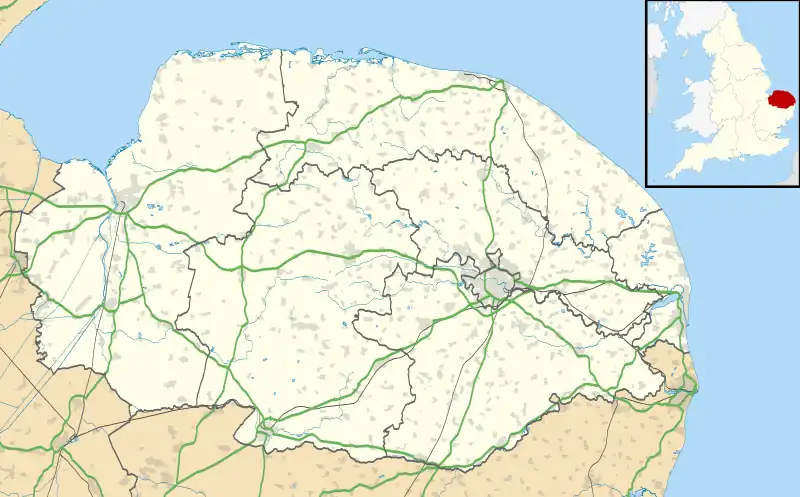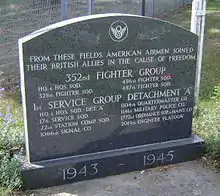| RAF Bodney USAAF Station 141 .png.webp) | |||||||||||
|---|---|---|---|---|---|---|---|---|---|---|---|
| Watton, Norfolk in England | |||||||||||
 Aerial photograph of Bodney airfield, looking north, 18 April 1944 | |||||||||||
 RAF Bodney Location in Norfolk | |||||||||||
| Coordinates | 52°33′44″N 000°42′48″E / 52.56222°N 0.71333°E | ||||||||||
| Type | Royal Air Force station | ||||||||||
| Code | BO[1] | ||||||||||
| Site information | |||||||||||
| Owner | Air Ministry | ||||||||||
| Operator | Royal Air Force[2] United States Army Air Forces | ||||||||||
| Controlled by | RAF Bomber Command * No. 2 Group RAF (1940-1943) Eighth Air Force (1943-1945) | ||||||||||
| Site history | |||||||||||
| Built | 1939-40 | ||||||||||
| In use | March 1940 - November 1945 | ||||||||||
| Battles/wars | European theatre of World War II | ||||||||||
| Airfield information | |||||||||||
| Elevation | 45 metres (148 ft)[1] AMSL | ||||||||||
| |||||||||||
Royal Air Force Bodney or more simply RAF Bodney is a former Royal Air Force Station located 4.5 miles (7.2 km) west of Watton, Norfolk, England.
Originally built as an RAF Bomber Command airfield during 1939-1940, Bodney was transferred to the United States Army Air Forces in the summer of 1943. Placed under the jurisdiction of VIII Fighter Command of Eighth Air Force, it was primarily the home of the 352d Fighter Group, the "Blue Nosed Bastards of Bodney". The unit briefly moved to Belgium in January 1945 due to the Battle of the Bulge, although it returned in April. It was closed after the 352d returned to the United States in November.[3]
History
Royal Air Force use
Initially it was used by aircraft of No. 21 Squadron RAF and No. 82 Squadron RAF[4] (No. 2 Group) Bomber Command. They carried operations over France and later the Netherlands and even Norway. Their Bristol Blenheim IVs were joined on occasions by, in May 1941, 90 Squadron evaluating its new Boeing Fortress Mk 1s[2] some Handley Page Hampdens for mining operations. 90 Squadron suffered heavy casualties and the use of the Fortress I was discontinued. Towards October 1942, the Blenheims were changed to Lockheed Venturas but the squadron moved on to RAF Methwold before the Venturas were operational.[5] Relief Landing Ground for No. 17 (Pilots) Advanced Flying Unit RAF between January 1942 and May 1943.[6]
United States Army Air Forces use


Lt. Lincoln Delmar Bundy, a North American P-51 Mustang fighter pilot flying from here, was shot down over occupied France on 10 June 1944.[7] Eluding capture, he joined a mixed group of French resistance fighters and British soldiers in the SAS. Their mission, known as Operation Bulbasket, was sabotage of SS units coming north to oppose the Normandy invasion. The group was ultimately captured, and Bundy, along with the others, was murdered.
USAAF Station Units assigned to RAF Bodney were:[3]
- 1st Service Group (VIII Air Force Service Command)[8]
352nd Fighter Group


See also
References
![]() This article incorporates public domain material from the Air Force Historical Research Agency
This article incorporates public domain material from the Air Force Historical Research Agency
Citations
- 1 2 Falconer 2012, p. 54.
- 1 2 "RAF Bodney". Control Towers. Retrieved 26 March 2015.
- 1 2 "Bodney". American Air Museum in Britain. Retrieved 1 March 2015.
- 1 2 3 4 "Bodney". Airfields of Britain Conservation Trust. Retrieved 12 April 2020.
- ↑ Smith 1994, p. 00.
- ↑ Sturtivant, Hamlin & Halley 1997, p. 43.
- ↑ MacIntyre, Ben. Rogue Heroes: the History of the SAS, Britain's Secret Special Forces Unit that Sabotaged the Nazis and Changed the Nature of War. Broadway Books, 2017; see also "Lincoln Delmar Bundy," American Air Museum in Britain. http://www.americanairmuseum.com/person/148807
- ↑ "1st Service Group". American Air Museum in Britain. Retrieved 2 March 2015.
Bibliography
- Falconer, J (2012). RAF Airfields of World War 2. UK: Ian Allan Publishing. ISBN 978-1-85780-349-5.
- Freeman, Roger A. (1978) Airfields of the Eighth: Then and Now. After the Battle ISBN 0-900913-09-6
- Freeman, Roger A. (1991) The Mighty Eighth The Colour Record. Cassell & Co. ISBN 0-304-35708-1
- Maurer, Maurer (1983). Air Force Combat Units Of World War II. Maxwell AFB, Alabama: Office of Air Force History. ISBN 0-89201-092-4.
- Smith, G. Norfolk Airfields in the Second World War. Countryside Books. 1994. ISBN 978-1853063206.
- Sturtivant, R; Hamlin, J; Halley, J (1997). Royal Air Force flying training and support units. UK: Air-Britain (Historians). ISBN 0-85130-252-1.
- mighty8thaf.preller.us Bodney
- 352d Fighter Group on www.littlefriends.co.uk
- USAAS-USAAC-USAAF-USAF Aircraft Serial Numbers--1908 to present